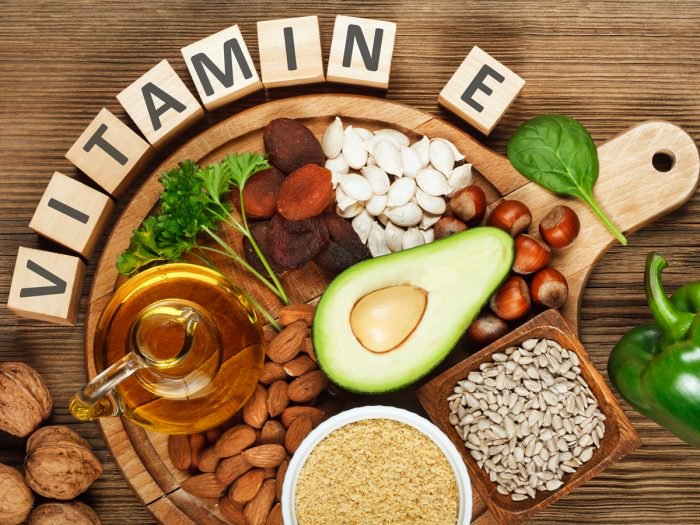
Vitamins are important for our body, but often get ignored in our obsession with proteins and fats. Vitamins are a part of the essential micro-nutrients that are required in smaller quantities by our body, for smooth functioning of a number of processes. Some of the most important vitamins required by the human body include vitamins A, B1, B2, B3, B5, B6, B9, B12, C, D, E and K. It's a long list to remember, but the good news is that if you consume a healthy and balanced diet, you may already be consuming a good majority of these vitamins on a daily basis. However, your nutritionist might be better able to shed light on exactly how much of each of these vitamins is required by your body. We're going to talk about vitamin E and its benefits as well as foods rich in vitamin E, in this article.
Benefits Of Vitamin E And Recommended Daily Allowance (RDA)
Vitamin E is a fat-soluble vitamin that has a number of forms. The one that is useful to our body, however, is alpha-tocopherol, the main role of which is to act like an antioxidant and hunt down free radicals in the body. Free radical damage is linked to a number of potentially fatal diseases, including cancer, atherosclerosis, dementia, diabetes etc. The recommended daily allowance of vitamin E (as specified by guidelines of the Institute of Medicine) is 15 mg for both men and women.
Here Are Some Benefits Or Roles Of Vitamin E That You Must Know About:
1. Vitamin E-rich foods and supplements may help in reducing heart disease risk.
2. Vitamin E, in combination with zinc, vitamin C and beta-carotene may protect against advanced age-related macular degeneration, indicating that this vitamin may protect eye health.
3. Some studies have shown that consuming vitamin E is linked with improvement in cognitive function and reduced risk of diseases like Alzheimer's and Parkinson's.
4. One study showed that taking vitamin E-rich foods and supplements may reduce risks of death from ALS or Amyotrophic Lateral Sclerosis, which is a rare condition that causes progressive muscle weakness.
5. Vitamin E has been hailed for its purported ability to stop production of free radical cells and protect the cells from damage by free radicals.
Sources Of Vitamin E, The Antioxidant Vitamin
1. Wheat Germ Oil
This oil is extracted from the germ of the wheat kernel and is one of the best dietary sources of vitamin E - 255 milligrams per 100 gram. However, wheat germ oil is extremely perishable and quite expensive.
2. Almonds
The most popular nuts around - almonds are nutritious and consumed for their many health benefits. A 100 grams portion of almonds contains 25.6 milligrams of Vitamin E.
3. Avocado
One of the most popular superfoods around, avocado is replete with healthy nutrients, including vitamin E that is 14 percent of the Daily Value per 100 grams of the fruit.
4. Sunflower Seeds
The seeds of sunflower are also consumed as healthy snacks, rich in mono and polyunsaturated fats, as well as vitamin E. A 100 grams portion of sunflower seeds contains 35.7 milligrams of vitamin E.
5. Peanuts and Peanut Butter
Peanuts are technically legumes that are most often mistaken for nuts. They are rich in protein and are consumed as snacks as well as in the form of peanut butter. Peanuts contain 44 per cent daily value of Vitamin E, per 100 grams portion.
6. Soyabean Oil
Some of the best dietary sources of Vitamin E are plant-based oils, including soyabean oil, which is widely used for cooking in a number of homes worldwide. Hundred grams of refined soyabean oil contains 8.8 milligrams of Vitamin E.
7. Spinach
One of the best low-calorie vegetables that- spinach- is a favourite of health freaks around the world. Spinach is a versatile vegetable with a wealth of nutrition including good amounts of Vitamins A, C and K. Spinach is also among the richest sources of Vitamin E among popular vegetables- 44 per cent of daily value per 100 grams.
A deficiency of vitamin E is rare, as it is needed in such trace amounts by the body and also because it is found in commonly consumed foods. However, those who do not consume enough fat in their diet may develop a deficiency of this vitamin. Some of the signs of vitamin E deficiency include reduced immunity, retinal damage, damage of the peripheral nerves resulting in pain and weakness in hands and legs and ataxia or loss of movement in body. If you notice one or more of these symptoms, contact a qualified medical professional.
Administering an antioxidant-enriched vitamin may decrease respiratory exacerbations in people with cystic fibrosis, a study suggests. Cystic fibrosis is an inherited life-threatening disorder that damages the lungs and the digestive system. The findings showed that supplementation with an oral antioxidant-enriched multi-vitamin was safe and well tolerated, and led to increased systemic antioxidant concentrations and a transient decrease in systemic inflammation. People with cystic fibrosis typically experience chronic bacterial infections, which lead to inflammation and the release of “vast amounts of reactive oxygen species in the airways,” said Scott D. Sagel, Professor at the University of Colorado in the US.
While normally the body would marshal an antioxidant defence to neutralize this oxidant stress, but cystic fibrosis is characterized by dietary antioxidant deficiencies. This contributes to an oxidant-antioxidant imbalance and more inflammation, which leads to lung damage and a progressive loss of lung function, Sagel added.
For the study, published in the American Journal of Respiratory and Critical Care Medicine, the team included nearly 100 patients for a 16-week study where 53 per cent of the antioxidant-treated group experienced 28 exacerbations, compared to 68 per cent of the control group who experienced 39 exacerbations.
The results showed a 50 per cent reduced risk to the first exacerbation requiring antibiotics in those receiving the supplemental antioxidants. “Improving antioxidant status in cystic fibrosis is an important clinical goal and may have a positive effect on health,” Sagel said.
“While the antioxidant supplement did not appear to exert sustained anti-inflammatory effects, we believe its effect on time to first pulmonary exacerbation was significant and clinically meaningful,” Sagel said, adding that the improvement in antioxidant status alone may justify its use. “Developing safe and effective anti-inflammatory treatments remains a key priority of the cystic fibrosis community,” he noted.









